Are you captivated by the vibrant colors and playful antics of toucans and wondering, “Can You Get A Toucan As A Pet?” At PETS.EDU.VN, we understand the allure of these exotic birds, and we’re here to provide you with a comprehensive guide to responsible toucan ownership. This includes the joys and challenges of welcoming a toucan into your family and exploring if owning a tropical bird aligns with your lifestyle. Delve into the world of toucan care, toucan behavior, and exotic pet ownership.
1. Understanding the Allure of Toucan Ownership
Toucans, with their oversized bills and striking plumage, are undeniably captivating birds. Their playful personalities and unique appearance make them highly desirable pets for some exotic bird enthusiasts. Their lively nature and distinctive calls can add a touch of the tropics to your home.
However, before giving in to the allure, it’s crucial to understand the realities of toucan ownership. These intelligent and active birds have specific needs that must be met to ensure their well-being. Understanding what to expect is vital before bringing a toucan into your home.
2. The Legalities of Owning a Toucan
Before you even consider bringing a toucan home, it’s essential to investigate the legality of owning one in your area. Regulations vary widely depending on your location, and some states or countries may prohibit private ownership of exotic birds like toucans.
2.1 Checking Local and National Laws
Contact your local animal control office, state wildlife agency, or national governing body for wildlife to determine the specific regulations in your area. Be aware of permit requirements, potential restrictions on certain species, and any other legal considerations. Ignoring these regulations can result in hefty fines, confiscation of your bird, or even legal action.
2.2 The Importance of Ethical Sourcing
If owning a toucan is legal in your area, ensure that you obtain your bird from a reputable and ethical source. Avoid purchasing toucans from breeders who engage in unethical practices, such as wild capture or neglecting the health and well-being of their birds. Look for breeders who prioritize conservation efforts and provide proper care for their toucans.
3. The Financial Commitment of Toucan Care
Owning a toucan is a significant financial commitment. From the initial purchase price to ongoing expenses like food, housing, and veterinary care, toucans can be quite costly pets. Careful financial planning is essential to ensure that you can provide for your toucan’s needs throughout its life.
3.1 Initial Costs
The initial cost of purchasing a toucan can range from $8,000 to $15,000 or more, depending on the species and breeder. Other upfront costs include a spacious enclosure, perches, toys, and feeding supplies.
3.2 Ongoing Expenses
Toucans require a specialized diet consisting primarily of fresh fruit, which can be expensive. They also need regular veterinary checkups, specialized toys for enrichment, and a climate-controlled environment. Be prepared to spend several hundred dollars per month on toucan care.
| Expense | Estimated Cost (Monthly) | Notes |
|---|---|---|
| Food | $200 – $400 | Fresh fruit, specialized pellets, occasional insects |
| Veterinary Care | $50 – $100 | Routine checkups, vaccinations, potential emergency care |
| Toys & Enrichment | $50 – $100 | Toucans need a variety of toys to prevent boredom and promote mental stimulation |
| Housing & Utilities | $100 – $300 | Climate control, enclosure maintenance, cleaning supplies |
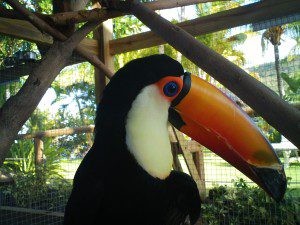
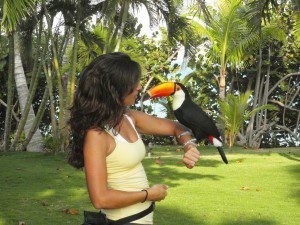

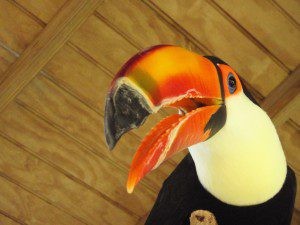
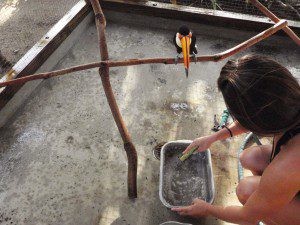
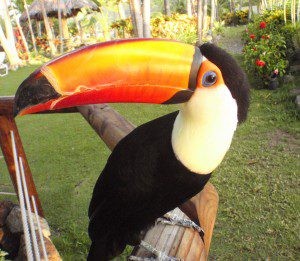
4. The Time Commitment of Toucan Care
Toucans are not low-maintenance pets. They require significant time and attention to thrive. From daily feeding and cleaning to providing enrichment and socialization, toucan ownership demands a considerable investment of your time.
4.1 Daily Care
Toucans need fresh food and water twice a day, and their enclosures must be cleaned daily to maintain good hygiene. They also require daily interaction and playtime to prevent boredom and maintain their mental well-being.
4.2 Enrichment and Training
Toucans are intelligent birds that need mental stimulation to prevent destructive behaviors. Provide a variety of toys, puzzles, and foraging opportunities to keep them engaged. Toucans can also be trained using positive reinforcement techniques.
4.3 Socialization
Toucans are social creatures that need regular interaction with their owners. Spend time talking to your toucan, playing games, and providing opportunities for socialization with other birds or animals, if appropriate.
5. Understanding Toucan Housing Requirements
Toucans need a spacious and secure enclosure that provides ample room for them to move around, fly, and play. The enclosure should be designed to meet their specific needs, including proper ventilation, temperature control, and protection from the elements.
5.1 Enclosure Size and Design
A toucan enclosure should be at least 8 feet wide, 8 feet deep, and 6 feet tall. The enclosure should be constructed of sturdy materials that cannot be easily damaged by the toucan’s strong beak. Provide a variety of perches at different heights and angles to encourage exercise and natural behaviors.
5.2 Indoor vs. Outdoor Housing
Toucans can be housed indoors or outdoors, depending on the climate and your personal preferences. Outdoor enclosures should be constructed of weather-resistant materials and provide protection from predators. Indoor enclosures should be well-ventilated and provide adequate lighting.
5.3 Environmental Enrichment
Toucans need a stimulating environment to prevent boredom and promote their mental well-being. Provide a variety of toys, such as swings, ladders, and puzzle feeders. Rotate the toys regularly to keep your toucan engaged.
6. The Importance of a Specialized Toucan Diet
Toucans have unique dietary needs that must be met to maintain their health and well-being. Their diet should consist primarily of fresh fruit, with a small amount of specialized pellets and occasional insects.
6.1 Fruit Selection
Toucans need a variety of fresh fruits, including papaya, mango, berries, grapes, and melon. Avoid feeding them avocado, chocolate, or other foods that are toxic to birds. Wash all fruits thoroughly before feeding to remove pesticides and other contaminants.
6.2 Pellet and Insect Supplementation
Toucans also need a specialized low-iron pellet to supplement their fruit diet. These pellets are formulated to meet their specific nutritional needs and prevent iron storage disease, a common problem in toucans. Offer a small amount of insects, such as crickets or mealworms, as an occasional treat.
6.3 Avoiding Iron Storage Disease
Toucans are highly susceptible to iron storage disease, a condition in which excess iron accumulates in the liver and other organs. This can lead to liver damage, organ failure, and death. Feeding a low-iron diet and avoiding iron-rich supplements can help prevent this disease.
7. Understanding Toucan Behavior and Temperament
Toucans are intelligent, playful, and social birds. However, they can also be noisy and destructive if their needs are not met. Understanding their natural behaviors and temperament is essential for successful toucan ownership.
7.1 Social Needs
Toucans are social creatures that need regular interaction with their owners or other birds. They can become lonely and depressed if left alone for extended periods. Spend time talking to your toucan, playing games, and providing opportunities for socialization.
7.2 Noise Levels
Toucans are known for their loud calls, which can be disruptive to neighbors. Consider this before bringing a toucan into your home, especially if you live in an apartment or close to others.
7.3 Destructive Behaviors
Toucans have strong beaks that they use to explore their environment. This can lead to destructive behaviors, such as chewing on furniture or tearing up carpets. Provide plenty of toys and opportunities for enrichment to minimize destructive tendencies.
8. Training and Enrichment for Toucans
Training and enrichment are essential for maintaining a toucan’s mental and physical well-being. Toucans are intelligent birds that can be trained using positive reinforcement techniques.
8.1 Positive Reinforcement Training
Positive reinforcement training involves rewarding desired behaviors with treats or praise. This method is effective for teaching toucans basic commands, such as step up, come, and stay.
8.2 Environmental Enrichment
Provide a variety of toys, puzzles, and foraging opportunities to keep your toucan engaged and prevent boredom. Rotate the toys regularly to maintain their interest.
8.3 Socialization and Interaction
Toucans need regular interaction with their owners or other birds. Spend time talking to your toucan, playing games, and providing opportunities for socialization.
9. Potential Health Concerns in Toucans
Toucans are susceptible to a variety of health problems, including iron storage disease, respiratory infections, and fungal infections. Regular veterinary checkups are essential for early detection and treatment of these conditions.
9.1 Iron Storage Disease
Iron storage disease is a common and potentially fatal condition in toucans. It is caused by the accumulation of excess iron in the liver and other organs. Symptoms include lethargy, loss of appetite, and abdominal swelling. Regular blood tests can help detect this disease early.
9.2 Respiratory Infections
Toucans are susceptible to respiratory infections, such as pneumonia and air sacculitis. Symptoms include coughing, sneezing, and difficulty breathing. Proper ventilation and hygiene can help prevent these infections.
9.3 Fungal Infections
Toucans can develop fungal infections, such as aspergillosis, in their respiratory system. Symptoms include lethargy, loss of appetite, and difficulty breathing. Antifungal medications are used to treat these infections.
10. Finding a Qualified Avian Veterinarian
Finding a qualified avian veterinarian is essential for the health and well-being of your toucan. Avian veterinarians have specialized training and experience in treating birds.
10.1 Locating an Avian Vet
Ask your local bird club or breeder for recommendations. You can also search online directories of avian veterinarians.
10.2 Questions to Ask
When choosing an avian veterinarian, ask about their experience with toucans and their knowledge of common toucan health problems. Inquire about their fees and payment options.
10.3 Regular Checkups
Schedule regular checkups for your toucan to ensure early detection and treatment of any health problems. These checkups should include a physical examination, blood tests, and fecal tests.
11. The Importance of Responsible Toucan Ownership
Toucans are exotic and demanding pets. Responsible ownership requires careful planning, significant financial resources, and a willingness to commit to the bird’s needs for its entire life.
11.1 Long-Term Commitment
Toucans can live for 20-25 years or more. Be prepared to provide for your toucan’s needs for its entire life.
11.2 Ethical Considerations
Consider the ethical implications of owning an exotic bird like a toucan. Ensure that you are obtaining your bird from a reputable and ethical source and that you are providing it with a life that meets its physical and psychological needs.
11.3 Conservation Efforts
Support conservation efforts to protect toucans in their natural habitats. Consider donating to organizations that are working to preserve toucan populations.
12. Rehoming a Toucan: A Last Resort
If, despite your best efforts, you are unable to provide for your toucan’s needs, rehoming may be the best option. Find a reputable rescue organization or sanctuary that can provide a loving and appropriate home for your bird.
12.1 Finding a Rescue Organization
Contact your local bird club or avian veterinarian for recommendations. You can also search online directories of rescue organizations.
12.2 Evaluating Potential Homes
When considering potential homes for your toucan, ensure that the new owner has the knowledge, experience, and resources to provide proper care. Visit the potential home and observe the conditions in which the bird will be living.
12.3 Surrendering Your Toucan
Be prepared to surrender your toucan to the rescue organization or new owner. Provide them with all of the information you have about the bird’s history, health, and behavior.
13. Debunking Common Myths About Toucans
Many misconceptions surround toucan ownership. Let’s dispel some common myths to provide a more accurate understanding of these fascinating birds.
13.1 Myth: Toucans are Easy to Care For
Reality: Toucans are not low-maintenance pets. They require specialized care, a specific diet, and a significant time commitment.
13.2 Myth: Toucans are Quiet Birds
Reality: Toucans are known for their loud calls, which can be disruptive to neighbors.
13.3 Myth: Toucans are Domesticated Animals
Reality: Toucans are wild animals that have not been domesticated. They still possess many of their natural instincts and behaviors.
14. The Joys of Toucan Companionship
Despite the challenges, owning a toucan can be a rewarding experience. These intelligent and playful birds can bring joy and companionship to the lives of their owners.
14.1 Unique Personalities
Toucans have unique personalities and can form strong bonds with their owners. They are known for their playful antics and their ability to learn tricks.
14.2 Intelligent and Curious
Toucans are intelligent birds that enjoy exploring their environment. They are curious and inquisitive, and they can provide hours of entertainment.
14.3 A Touch of the Tropics
Owning a toucan can bring a touch of the tropics to your home. Their vibrant colors and distinctive calls can create a unique and stimulating environment.
15. Alternative Exotic Birds to Consider
If you’re drawn to exotic birds but are unsure if a toucan is the right fit, consider these alternative species that may be more suitable for your lifestyle:
15.1 Macaws
Macaws are large, colorful parrots known for their intelligence and playful personalities. They require a spacious enclosure and a significant time commitment, but they can be rewarding companions.
15.2 Cockatoos
Cockatoos are affectionate and intelligent parrots known for their distinctive crests. They require a lot of attention and can be prone to behavioral problems if their needs are not met.
15.3 Conures
Conures are smaller parrots known for their playful personalities and vibrant colors. They are relatively easy to care for and can make good pets for first-time bird owners.
| Bird Species | Size | Temperament | Care Level | Noise Level |
|---|---|---|---|---|
| Macaw | Large | Intelligent, Playful | High | High |
| Cockatoo | Medium | Affectionate, Intelligent | High | Medium |
| Conure | Small | Playful, Social | Medium | Medium |
16. Creating a Stimulating Environment for Your Toucan
Enrichment is crucial for a toucan’s well-being. A stimulating environment can prevent boredom, reduce stress, and promote natural behaviors.
16.1 Foraging Opportunities
Provide opportunities for your toucan to forage for food. Hide treats in toys or puzzle feeders to encourage them to search for their meals.
16.2 Variety of Toys
Offer a variety of toys, such as swings, ladders, and chew toys. Rotate the toys regularly to keep your toucan engaged.
16.3 Social Interaction
Spend time interacting with your toucan daily. Talk to them, play games, and provide opportunities for socialization with other birds or animals, if appropriate.
17. Toucan-Proofing Your Home
Toucans are curious and can be destructive. Take steps to toucan-proof your home to protect your belongings and ensure your bird’s safety.
17.1 Covering Furniture
Cover furniture with blankets or sheets to protect it from chewing and scratching.
17.2 Removing Toxic Plants
Remove any toxic plants from your home. Toucans may nibble on plants, which can be harmful if they ingest poisonous substances.
17.3 Securing Electrical Cords
Secure electrical cords to prevent your toucan from chewing on them. Electrical shock can be fatal.
18. Understanding Toucan Vocalizations
Toucans communicate through a variety of vocalizations, including barks, yelps, and croaks. Understanding these vocalizations can help you better understand your bird’s needs and emotions.
18.1 Recognizing Different Calls
Learn to recognize different toucan calls, such as alarm calls, contact calls, and mating calls.
18.2 Responding Appropriately
Respond appropriately to your toucan’s calls. If they are making an alarm call, investigate the source of the disturbance. If they are making a contact call, respond with a reassuring voice.
18.3 Managing Noise Levels
If your toucan’s vocalizations are disruptive, try to identify the cause of the noise. Are they bored, lonely, or stressed? Provide enrichment, attention, and a safe environment to reduce noise levels.
19. The Role of Conservation in Toucan Ownership
Responsible toucan ownership includes supporting conservation efforts to protect these birds in their natural habitats.
19.1 Supporting Conservation Organizations
Donate to organizations that are working to preserve toucan populations and their habitats.
19.2 Avoiding Wild-Caught Birds
Never purchase wild-caught toucans. This practice contributes to the decline of wild populations.
19.3 Promoting Sustainable Practices
Promote sustainable practices that protect toucan habitats, such as reducing deforestation and supporting eco-tourism.
20. Building a Bond with Your Toucan
Building a strong bond with your toucan requires patience, understanding, and a willingness to meet their needs.
20.1 Spending Quality Time
Spend quality time with your toucan daily. Talk to them, play games, and provide opportunities for interaction.
20.2 Learning Their Preferences
Learn your toucan’s preferences. What are their favorite toys? What kind of attention do they enjoy?
20.3 Building Trust
Build trust with your toucan by being consistent, gentle, and predictable. Avoid sudden movements or loud noises that may frighten them.
Ultimately, the decision of whether or not to own a toucan is a personal one. By carefully considering the information presented here and thoroughly researching the species, you can make an informed decision that is in the best interest of both you and the bird.
FAQ About Toucan Ownership
- Are toucans good pets for beginners? No, toucans are not recommended for beginner bird owners due to their specialized care needs.
- How long do toucans live in captivity? Toucans can live for 20-25 years or more in captivity with proper care.
- What do toucans eat in the wild? Toucans primarily eat fruit in the wild, supplementing their diet with insects, eggs, and small vertebrates.
- Are toucans affectionate birds? Toucans can be affectionate with their owners, but they are not as cuddly as some other bird species.
- Do toucans talk? Toucans can mimic sounds and learn to say a few words, but they are not known for their talking abilities.
- Are toucans messy pets? Yes, toucans are messy eaters and tend to fling their food around.
- Do toucans need a lot of space? Yes, toucans need a spacious enclosure to fly and exercise.
- Can toucans be trained? Yes, toucans can be trained using positive reinforcement techniques.
- Are toucans endangered? Some toucan species are threatened or endangered due to habitat loss and hunting.
- How much does it cost to own a toucan? The cost of owning a toucan can range from $8,000 to $15,000 upfront, with ongoing monthly expenses of several hundred dollars.
At PETS.EDU.VN, we are committed to providing you with the information you need to make informed decisions about pet ownership. Visit our website at PETS.EDU.VN for more articles, guides, and resources on exotic bird care. You can also contact us at 789 Paw Lane, Petville, CA 91234, United States or Whatsapp: +1 555-987-6543.
Disclaimer: The information provided in this article is for general informational purposes only and does not constitute veterinary advice. Always consult with a qualified avian veterinarian for any health concerns or before making any decisions related to your pet’s health or treatment.
Remember, responsible pet ownership is a lifelong commitment. If you’re prepared to meet the unique needs of a toucan, you may find the experience to be incredibly rewarding. But if you have any doubts, explore other exotic bird options that may be a better fit for your lifestyle. And for those eager to deepen their understanding of toucan care and exotic pet ownership, PETS.EDU.VN stands ready to guide you on your journey. Visit pets.edu.vn to explore a wealth of resources and services tailored to the unique needs of exotic pet owners everywhere. Your feathery friend will thank you.
